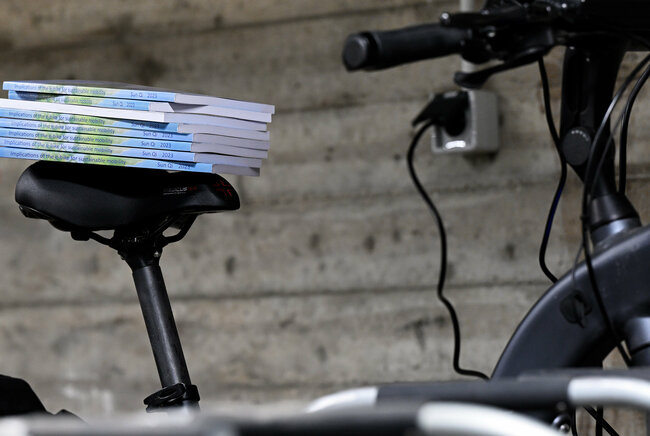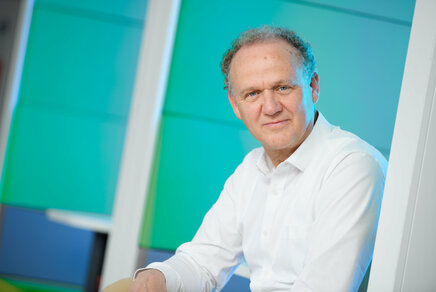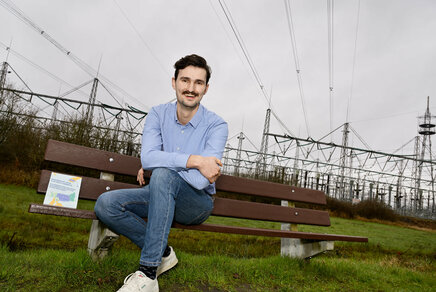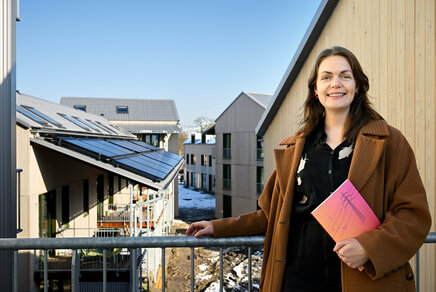A PhD without printing
Sun Qi defended her PhD thesis at the department of Industrial Engineering and Innovation Sciences on June 20th.

Doctoral candidate Sun Qi studied the role played by electric bikes in making our mobility greener. She wanted to extend her green reach by making her own doctoral graduation as sustainable as possible. But with only a digital version of her thesis, she can't gain her PhD; a minimum number of printed copies is mandatory. Sun hopes that as the TU/e community becomes greener, the option of not printing will be embraced. Until then, she is happy to share her tips for producing a greener thesis.
Gathering dust in the bookcase in Sun Qi's workplace is a lengthy row of theses – written by colleagues, friends, and acquaintances. Why should the same fate await my thesis, Sun wondered. And so she was keen to gain her doctorate having produced only a digital version of the thesis. Better for the environment, and for the university as it would save their share of the printing costs. Despite this, when she defended her thesis on Tuesday June 20th at the Department of Industrial Engineering and Information Sciences, and Sun, like the committee members, had a paper copy of her thesis lying before her.
Tangible reminder
“For many PhD candidates their slender publication is a tangible reminder of four years of research and everything that involves,” explains Sun. “But, let's be honest, we all know that of the mountain of theses you get printed, only a handful are read. They'll be flicked straight through to the acknowledgments, with a bit of luck some attention will be paid to the general introduction and the public summary. So really a couple of pages in hard copy is all you need, instead of boxes full of books.”
Sun studied the role electric bikes can play in making our mobility greener. The Netherlands has more bikes than people, and of its 23.4 million bikes, 3.4 million are already electric. The proportion of new electric bikes continues to rise; last year e-bikes accounted for more than half of all bikes sold. Although Sun observed that in many cases the e-bike was replacing an ordinary bike, she points out that the big picture is more complex.
“The Netherlands is a bike country through and through. Internationally, with 27 percent of daily trips being made by bike, we lead the field. But if we look at the number of kilometers covered daily, the car accounts for by far the largest share. In the number of people who commute by electric bike instead of the car we are seeing an increase. And while this doesn't yet seem to be bringing down car numbers significantly, in the larger scheme of things it's certainly the greener option. As an economic option, too, the e-bike often scores better than a car – it's cheaper to buy and run and has other benefits, like no parking fees.”
Lifestyle change
But if we really want to take a step towards sustainability, Sun believes, then systemic changes are essential. “We're still talking too much about cars. We have to look further than this four-wheeled fuel-powered box. More sustainable transport means committing to walking, cycling and public transport. And that means adapting our lifestyle.”
For Sun herself, a sustainable lifestyle has become second nature, and it's something she is encouraging at her workplace. With a couple of others at TU/e she is part of the TU/e Low Carbon Travel Initiative, and she urges people to think twice before taking a flight to a conference, to find instead a greener alternative.
Freedom of choice
For her doctorate, too, Sun went in search of more sustainable options. She had thought she could skip printing her thesis, but was frustrated to learn that a digital version alone would not suffice. “To be able to gain a doctorate, you have to submit a minimum number of hard copies, the number varies per department. Two of these are for the TU/e Library and each member of the doctoral committee receives a hard copy. But I've published all my research on open access platforms. Besides, every thesis produced at a Dutch university can be viewed online through the university libraries. All these theses are publicly available, free of charge. Sometimes an old-fashioned tradition is ripe for a critical review.”
Sun underscores the need for non-printing to be an option for those who want it. “Freedom of choice, instead of being forced to waste paper and money. After all, every PhD candidate is entitled to university assistance with their printing costs, which for TU/e means hundreds of thousands of euros every year. This taxpayer's money can be more usefully spent. With a digital version everyone can decide for themselves whether and which parts they print out.”
Paint and paper
Eventually Sun had no choice but to have fifteen copies of her thesis printed. A green design agency guided her through the world of paper types and alternatives to harmful colored inks. There are a lot of options, she warns. “Every printing house has an environmentally friendly printing option. By choosing a simple layout, you can limit the use of color in your thesis. There's your cover, you can have the design colored in using eco-friendly water-based paint. And you can simply leave off the standard plastic coating on the cover. To limit costs, you can find a budget copy shop where you aren't tied to a minimum print run.”
As well as sticking to the mandatory minimum number of copies of her thesis, Sun also chose to give to a charity she supports instead of getting gifts for her promotion, and her guests will be offered vegetarian and vegan snacks with their drinks. She has made a point of asking the caterer to avoid using disposable tableware.
“I'm aware that more and more PhD candidates around me are making sustainable choices and are bothered by the mindless printing of piles of theses. Why is it so difficult to give the digital thesis equal status? I'm no big influencer, I'm just doing a PhD. Even so, I hope that I can get people thinking about greener choices, and can bring together people who share the same ideas, so that we can tackle this issue. Every change starts with a small step, and as Greta Thunberg says: 'No one is too small to make a difference'.”
What is already possible?
Professor Anna Wieczorek, TU/e Sustainability Officer: “More and more PhD candidates are telling me that they'd like to be rid of the requirement to print their thesis. Sun Qi is the first person to come to me with the idea of TU/e offering the option not to print. Rules offer structure and certainty, but from time to time they need to be critically reviewed. I fully support her request, and am looking at how it may be possible to gain a PhD with only a digital thesis. Hopefully, we'll be able to offer a print-less option for anyone who wants it, and in time it will become the new norm.”
Professor Paul Koenraad, dean of the Graduate School: “It's already possible to have a very small number of theses printed: two copies for the TU/e Library – documentation rules mean this will remain mandatory – and a copy for each member of the doctoral committee. We'll be discussing shortly whether the committee must have hard copies or whether a digital version will suffice. For the rest, we recently reduced the standard contribution towards printing costs to 500 euros (every department could decide the exact amount, and at some departments it was up to 1,000 euros, ed.) in order to limit overly large print runs of theses.”
Source: Cursor.
Media contact
More on Sustainability



Latest news


![[Translate to English:] [Translate to English:]](https://assets.w3.tue.nl/w/fileadmin/_processed_/e/0/csm_BvOF%202019_1031_BHF%20license%20TUe%20ILI%20copy_8a50884392.jpg)